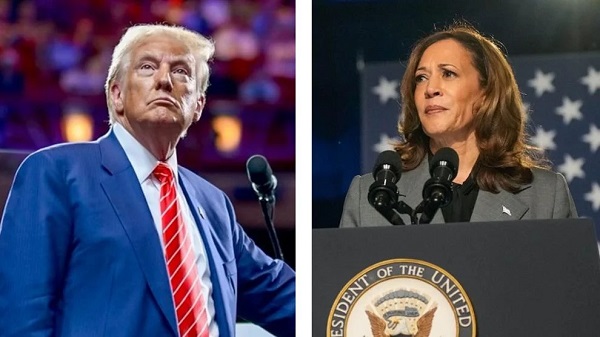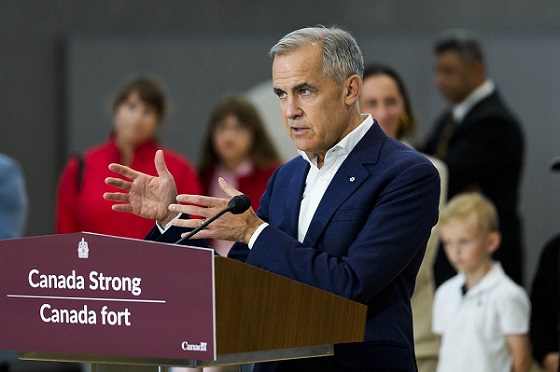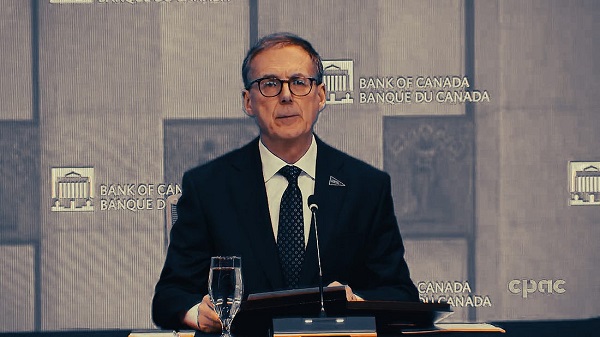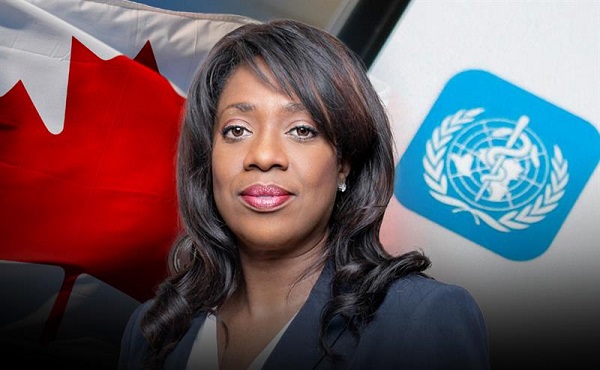Opinion
The majority of voters have moved on from legacy media and legacy narratives

From EnergyNow.ca
By Margareta Dovgal
A Wake-Up Call for Political Strategists Across the Continent
For only the second time in US history, a president has lost, left office, and won re-election. For most Canadians watching the US election, the news of Donald Trump’s impending return to the White House comes with some degree of disappointment – and confusion.
Rather than getting caught up in doomsaying as there’s enough of that going around, I wanted to share some thoughts on what I would hope Canadians working in and around politics and policy come away with.
Speaking to the heart shouldn’t neglect speaking to the wallet
Biden probably should have resigned sooner, and Harris should have gone through a competitive primary race before carrying the flag. Hindsight is 20/20, and I doubt that the Democrats will make those same mistakes twice.
What I do suspect will be harder to shake is the commitment to running campaigns on social issues alone. The Democrats made the gamble that reproductive rights were a persuasive enough ballot box question to distract from Joe Biden’s lacklustre economic performance.
The clear majority of voters showed that they are more concerned with their job security, housing affordability, and tax bills.
The Democrats now have an opportunity to realign with the concerns of working Americans, recognizing that economic anxieties cannot be overlooked. A robust economic approach doesn’t preclude a moderate and fair social approach, but the latter can’t replace the former.
In Canada, this holds true for our discussions around energy and resources. I’m seeing a very similar disconnect play out on resource policy. Patently bad policies with horrible economic impacts are being advanced at all levels by governments more concerned with virtue signalling than ensuring robust economic performance – the federal Emissions Cap and the fantastical ambitions of David Eby’s CleanBC program among them.
Pre-pandemic, vibes-based economic policy seemed to work. In times of plenty, it is easy to persuade voters that taking economic hits is the right thing to do — after all, why worry about the price of something if you can afford it? Anyone still trying that in 2024 has lost the plot.
Affordability remains a paramount issue for many citizens, and the U.S. election highlighted how campaigns that overlook economic concerns and the declining quality of life risk alienating voters.
From groceries to gas prices, the rising cost of living is top of mind for Canadians, and resource policies must reflect this reality. For instance, a balanced approach to energy production can help keep costs reasonable while supporting Canadian jobs and industries.
It’s a reminder that beyond political credibility or mainstream appeal, policies that directly address financial challenges resonate most with the electorate.
For the resource sector, this means recognizing how affordable energy, resilient supply chains, and robust employment opportunities are interconnected with national policy priorities.
Truth and gatekeeping
The gamesmanship over who holds the authority to define “truth” continues in earnest, and engaging in it by discounting mass popular narratives is a risky gambit for any political movement that seeks to maintain widespread relevance.
We’re seeing a generational change, not just in the US but globally, on how people consume and produce media.
I would argue that Elon Musk’s purchase of Twitter was the edge that Trump needed in this new era. Millions of Americans, and millions abroad, sought news and commentary from the platform. Political discourse on the 2024 election was shaped by the ideas generated and amplified online, faster than mainstream news could reliably pick up on.
Since Musk’s acquisition of Twitter/X, the editorial stance, algorithm, and tone of the platform have all shifted. Yes, it has gone ‘rightwards’, but rather than that serving to shrink the audience, it has instead grown, picking up swing voters and rallying the “persuadeds” more effectively.
Just look at the last debate between Trump and Harris: they weren’t even talking about the same political realities.
Research finds that as a main source of news, social media is still behind TV. Where we see the biggest difference is among younger voters.
46% of Americans 18-29 say social media is their top source of news, according to Pew Research. Beyond widespread appeal or readership, social media drives the political commentary of the chattering classes more than any one other platform. TikTok’s influence is likewise growing, with an even younger demographic relying on it almost entirely to help shape and articulate their views.
A similar dynamic around “truth” was plainly obvious in British Columbia’s provincial election last month. A good chunk of commentators couldn’t fathom that voters could accept a party that had refused to throw out candidates saying offensive or dubious things.
The BC Conservatives went from zero seats to just shy of government.
Enough ink has been spilled on this by other commentators, but let’s recap what many have said about the explanatory factors: BC United collapsed following its disastrous rebrand, the BC NDP was stuck with having to account with the inevitable baggage of incumbency in a struggling global economy, and the rise of Poilievre and the federal Conservatives lent some additional name-brand recognition to the BCCP.
The most important piece, in my estimation, was the Conservatives’ ability to tap into a growing demographic that didn’t feel their concerns were reflected in the mainstream political discourse. Twitter was far from the only forum for this, but I think it had a large part to play in cultivating the sense among many voters that consequential narratives were not even remotely being touched on in mainstream media. It gutted voters’ trust in the media, giving the BC Conservatives whose narratives were more effective on social media a decisive advantage.
Public safety is a great example of this. Anyone with eyes and ears who has spent time in Downtown Vancouver in recent years can attest to the visible decline, with visible drug use in public spaces, frequent run-ins with people with severe untreated mental illness yelling at phantoms, and unabashed property crime.
Yet, if we were to believe a great deal of commentators just up until the eve of the election, everything was just fine.
Willful blindness only works when people can’t comment on what they see. But comment they did, and the delayed response to it nearly cost the BC NDP the election.
In a purely practical sense, the increasing role of community-driven sources of information mean that gatekeepers can no longer control the flow of information. And let’s not mince words here: anyone concerned about misinformation is talking about gatekeeping.
Subjecting ideas out there in the commons to scrutiny is necessary. We just can’t take for granted that the outlets themselves will provide that editorial scrutiny directly, if it’s not baked in the platform by design and people are actively choosing to spend time on platforms that have a radical free speech mandate.
It’s time to accept that the train has left the station: persuasiveness needs to be redefined by the mainstream, rather than taking one loss after another and crying foul because the game has changed.
Canadian narratives for Canadian politics
Our closest neighbour and trading partner is the world’s largest economy, and Canadians can’t help but look south for news and ideas. Our own politics often mirror the messages we see in the US, and there’s no use trying to pretend that won’t keep happening.
If we want to avoid falling into the trap of inheriting the dysfunction and divisions that are increasingly defining the political system next door, we have a duty to develop compelling narratives that resonate with the unique needs of Canadians, across the political spectrum.
It’s the definition of insanity to keep trying the same things expecting a different result. Rather than directing anger at voters and political movements who have moved on from old media, if you’re not happy with the result, try meeting them where they are.
And no, this doesn’t mean ceding ground to conspiracy theorists or the fringe. They are only succeeding because a) they are speaking to issues that people decide they care about (like them or not) that are panned by the center and the left, and b) most crucially, there isn’t enough emotionally resonant, persuasive substance being put out to win hearts and minds.
These are not inevitable outcomes. Voter preferences and media technologies are constantly evolving. We need to evolve with them by subjecting our leaders to real scrutiny and demanding better.
Margareta Dovgal is Managing Director of Resource Works. Based in Vancouver, she holds a Master of Public Administration in Energy, Technology and Climate Policy from University College London. Beyond her regular advocacy on natural resources, environment, and economic policy, Margareta also leads our annual Indigenous Partnerships Success Showcase. She can be found on Twitter and LinkedIn.
National
Watchdog Presses Ottawa to Release Hidden Lobbying Rulings

With nine cases still undisclosed and a reappointment controversy surrounding the Lobbying Commissioner, the group warns that federal enforcement of ethics laws is losing public trust
More than a year has passed. Ten separate lobbying violations. Nine of them returned by the RCMP without prosecution. Zero public rulings. And a Commissioner who was quietly re-appointed for another seven-year term by the Trudeau regime.
What am I describing? A third-world dictatorship? Nope. Welcome to Ottawa—where democracy dies behind closed doors, and corporate lobbyists write the laws under the table.
Today, Democracy Watch, the last half-functioning watchdog in this country, blew the whistle. Again. They released a bombshell press release accusing Nancy Bélanger, Trudeau’s handpicked Lobbying Commissioner, of hiding her rulings on serious violations of the Lobbying Act. These aren’t minor infractions. We’re talking about shady dealings by major players: Facebook, WE Charity, SNC-Lavalin, and Imperial Oil—names you may remember from past scandals the media tried to memory-hole.
The facts are simple. Democracy Watch filed official requests to get these rulings. The RCMP, under Trudeau’s appointees, delayed disclosure for two years. Bélanger’s office extended its own deadline, then just… never released them. That’s illegal, by the way. But when the Liberals are in charge, the law doesn’t apply to them—only to you.
Now, why would they bury these reports? Well, ask yourself: who benefits?
Start with Facebook. Back in 2018, Kevin Chan—their top Canadian fixer—was caught giving “advice” to Cabinet ministers while failing to register as a lobbyist. Not exactly subtle. Then there’s WE Charity, Trudeau’s favorite shell organization for funneling money to friends and family. They handed out luxury trips to Bill Morneau’s family. Did they face charges? Nope. SNC-Lavalin—remember them? The company Trudeau went to the mat for in 2019, firing his own Attorney General to protect. And Imperial Oil? They lobbied Andrew Scheer and Karina Gould at a corporate event they sponsored. Nothing to see here, folks.
Here’s the question no journalist in Ottawa will ask: Did Nancy Bélanger bury these rulings in exchange for her reappointment last December? Did she gut the Lobbyists’ Code of Conduct, water down the rules, and turn a blind eye to violations just to keep her job? It’s not a conspiracy theory—it’s an obvious incentive. And it stinks.
Democracy Watch co-founder Duff Conacher was blunt: “By continuing to hide her rulings on nine lobbying violations, Commissioner Bélanger is covering up scandalous situations, protecting the lobbyists and politicians and public officials they were lobbying.”
That’s the polite version.
The real version? The Trudeau Liberal regime—and yes, we’re still calling it the Trudeau regime even with Mark Carney as his bland globalist replacement—is corrupt to its core. This is a government that protects its friends, buries oversight, and weaponizes institutions like the RCMP and the Office of the Lobbying Commissioner to silence dissent and cover up for insiders.
Just look at the pattern:
- RCMP Commissioner Brenda Lucki was Trudeau’s puppet.
- Her successor, Michael Duheme, was appointed after the RCMP “let off” the lobbyists.
- Bélanger, who failed to disclose 10 rulings, gets another 7 years in power.
Coincidence? Please.
Eighty percent of Canadians—across the spectrum—say they’re concerned about unethical lobbying. And they should be. Because what we’re seeing isn’t just a few bad actors. It’s institutionalized corruption. And worse—it’s bipartisan silence. Where is the outrage? Where is the mainstream press? They’re too busy fact-checking memes and writing hit pieces on Pierre Poilievre to ask why the Lobbying Act has been turned into toilet paper.
The Liberal swamp didn’t get drained. It got deeper. And if you think electing a new face like Mark Carney will change anything, think again.
Carney was Trudeau’s right-hand globalist — a man who cut his teeth at Goldman Sachs, then went on to run both the Bank of Canada and the Bank of England. He didn’t come back to serve Canadians — he came to manage them, like assets on a spreadsheet. He now rules Ottawa like a boardroom, where accountability is a nuisance and democracy is a branding exercise.
The Liberal swamp didn’t get drained. It got deeper. And if you think electing a new face like Mark Carney will change anything, think again.
Lets be clear: What this country needs isn’t another bureaucratic shuffle. We need a reckoning. We need real transparency. And we need to dismantle the corrupt machinery that allows lobbyists, politicians, and unaccountable commissioners to play god behind closed doors.
This isn’t about left or right. This is about the survival of Canadian democracy.
Because right now, it’s being auctioned off—one lobbying meeting at a time.
Opinion
Bill Gates Shakes Up the Climate Discussion

Bill Gates’ new climate letter made some people angry and others happy. Everyone has an opinion. Today I share mine. Image: Grok.
 The Honest Broker
The Honest Broker
It is not just his three truths, but the fact that he said them out loud
Wednesday, in his periodic letter to the world, Bill Gates shared three truths about climate change — and shook up the climate discussion. While the longer term implications of his letter are uncertain, early signs are that Gates has injected a welcome dose of climate realism into the discussion.
Here are his three truths (and I encourage everyone to read his whole letter):
- Climate change is a serious problem, but it will not be the end of civilization;
- Temperature is not the best way to measure our progress on climate;
- Health and prosperity are the best defense against climate change.
For most THB readers, these truths will be well understood, even common sense, and will seem neither shocking nor scandalous.
But for some steeped in climate advocacy grounded in visions of “existential threat” or a looming apocalypse, Gates’ truths have rocked their world.
Some examples from the activist media:
- CNN: “a stunning claim”;
- Politico: “soft pedals climate”;
- Axios: “escalates debate with scientists”;
- The New Republic: “we shouldn’t be listening to people like him”
Activist climate scientists joined their fellow-traveling media critics, criticizing the substance of Gates’ letter or expressing concerns that their political enemies might welcome it — Here are a few examples:
- Michael Mann: “This is horrifying . . . [climate change] represents an existential threat, exacerbating global security threats, threatening water and food supplies, leading to massive damage. . . it’s like a game of soft climate denial bingo”;
- Jonathan Foley: “I stopped listening to Bill Gates years ago. You should stop too”;
- Michael Oppenheimer: “{h]is words are bound to be misused by those who would like nothing more than to destroy efforts to deal with climate change.”
Of course, at the other end of the spectrum, there is President Donald Trump, who posted the following, which is just as over-the-top as the reactions from climate activists:
Just like the climate activists, President Trump is treating the letter as an ink blot for political messaging, rather than on its own merits.
I suspect the president does not agree with this statement by Gates:
“Climate change is a very important problem. It needs to be solved, along with other problems like malaria and malnutrition.”
From my perspective, Gates’ letter is a welcome contribution to a growing chorus of climate realism and energy pragmatism.
I’ve been asked by several people if I think Gates reads THB or my work — I doubt it, or else he wouldn’t have made a big mistake in his letter suggesting that extreme climate scenarios are today implausible due to climate policy successes. They are implausible because they were always wrong about coal.
I’ve never met Gates, but Bill should definately read THB!
Yesterday, as I settled into my seat for the flight back from Florida (where I spoke at New College) I was invited on very short notice to write an op-ed for the NY Post on Gates letter. I wrote it on the plane and sent it in somewhere over Oklahoma.
I reproduce the op-ed in full below. You can read it at the NY Post site here.
Why Bill Gates turned on the alarmists, and decided climate change isn’t the apocalypse (NYP title)
Earlier this week, Microsoft co-founder and billionaire philanthropist Bill Gates dropped a truth bomb into the discussion of climate and energy policy. His missive sent the climate lobby into a tizzy as he joined a growing chorus of voices aligned with today’s science and policy consensus on climate.
Gates actually shared three truth bombs, and let’s take a look at each.
Truth #1: Climate change is a serious problem, but it will not be the end of civilization
Here Gates recognizes that the most extreme projections of future climate change have been dialed back considerably over the past decade. Gates explains correctly, “the current consensus is that by 2100 the Earth’s average temperature will probably be between 2°C and 3°C higher than it was in 1850.”
This consensus has rapidly emerged not because the world has rapidly reduced emissions (as Gates incorrectly asserts), but rather because scientists have recognized that those extreme scenarios that have dominated climate research and policy were actually off target from the start.
Specifically, in work pioneered by my colleague Justin Ritchie of the University of British Columbia almost a decade ago, we now know that the previous generation of climate scenarios foresaw a world rushing headlong into coal energy to power the world.
Coal is the most carbon-intensive fossil fuel and a global energy system dominated by coal would indeed have had massive emissions with correspondingly largest effects on climate.
In reality, rather than in models, our research shows the world is not rushing into coal and the scenarios that projected as much as a six-fold increase in coal consumption are already implausible. The real world has already departed substantially from these projections.
In recent years, projected global temperature increases to 2100 have been successively revised downwards. Earlier this month the Norwegian group DNV issued its “most likely” projection for global temperatures this century to be a 2.2C increase and achievement of net-zero emissions by the 2090s.
These achievements would not hit the targets of the 2015 Paris Agreement under the U.N Framework Convention on Climate Change, but they are far from a global existential threat, according to the projections of the Intergovernmental Panel on Climate Change.
The new consensus is so robust that those taking Gates to task on this point might be considered today’s new climate deniers.
Truth #2: Temperature is not the best way to measure our progress on climate
For many, Gates assertion would appear obvious. He explains, “the global temperature doesn’t tell us anything about the quality of people’s lives.”
Consider the remarkable progress made over the past 150 years with respect to the human impact of extreme weather events.
Way back in the 1870s — when global temperature were supposedly ideal — approximately 50 million people died globally related to extreme weather, particularly related to an extreme El Nino event of 1877-88.
The 1870s also saw the Great Midwest Wildfires of 1871 which killed as many as 2,400 people, the massive 1872 Baltic Sea flood, a 1875 midwestern locust swam of an estimated 12.5 trillion locusts, the 1878 China typhoon that killed as many as 100,000 people, and the U.S. experienced 6 landfalling major hurricanes in the 1870s, compared to just 3 in the 2010s.
It is not widely appreciated, but 2025 (still with two months to go), is currently on track for the lowest global death toll from extreme weather in all of human history. Part of that is good fortune to be sure — for instance, the Northern Hemisphere is well below average in terms of tropical cyclone activity.
However, 2025 fits a remarkable long-term trend of lives improving due to advance in the applications of science and technology in preparing for disasters, coupled with the consequences of sustained economic growth around the world.
Sustaining that track record will take concentrated effort, but there is no reason that the human condition cannot continue to dramatically improve this century even as temperatures warm another degree or so.
Truth #3: Health and prosperity are the best defense against climate change
To understand this claim, there is no need to look at futures in computer models, one just needs to look at the world as it is today.
Think about it. Would you feel more protected against the vagaries of climate variability and change if you lived in one of the world’s poorest countries or one of its richest?
Now imagine if everyone around the world enjoyed the economic and technological advantages of the United States. Of course resiliency to changes in climate would be much greater if everyone around the world were as wealthy as those of us in the United States. As Gates observes: “Development doesn’t depend on helping people adapt to a warmer climate — development is adaptation.”
Gates includes what might have been a fourth truth, and one we should not forget: “Climate change is a very important problem. It needs to be solved, along with other problems like malaria and malnutrition.”
Understanding the true nature of a problem is a key first step in effectively addressing it. Climate change is indeed real, but it is not the apocalypse.
Comments welcomed! Please keep them on subject and as usual, no comments of a personal nature about anyone, thanks!
Before you go — If you think that we are making progess on climate realism and energy pragmatism and would like to see even more, then please click that “ Like” to let everyone know. More likes mean that THB rises in the Substack algorithm and gets in front of more readers. More readers mean that THB reaches more people in more places, broadening understandings and discussions of complex issues where science meets politics. Thanks!
Like” to let everyone know. More likes mean that THB rises in the Substack algorithm and gets in front of more readers. More readers mean that THB reaches more people in more places, broadening understandings and discussions of complex issues where science meets politics. Thanks!
For the full experience, upgrade your subscription.
-

 Business2 days ago
Business2 days agoCanada heading into economic turbulence: The USMCA is finished and Canadian elbows may have started the real fight
-

 National2 days ago
National2 days agoCanadian MPs order ethics investigation into Mark Carney’s corporate interests
-

 National2 days ago
National2 days agoCanada’s NDP is now calling women ‘non-males’
-

 Banks2 days ago
Banks2 days agoBank of Canada Cuts Rates to 2.25%, Warns of Structural Economic Damage
-

 Business2 days ago
Business2 days agoFord’s Liquor War Trades Economic Freedom For Political Theatre
-

 Health2 days ago
Health2 days agoLeslyn Lewis urges Canadians to fight WHO pandemic treaty before it’s legally binding
-

 Alberta1 day ago
Alberta1 day agoNobel Prize nods to Alberta innovation in carbon capture
-

 MxM News1 day ago
MxM News1 day agoTrump ‘Grateful’ For Bill Gates Pivot, Declares Victory Over ‘Climate Change Hoax’












